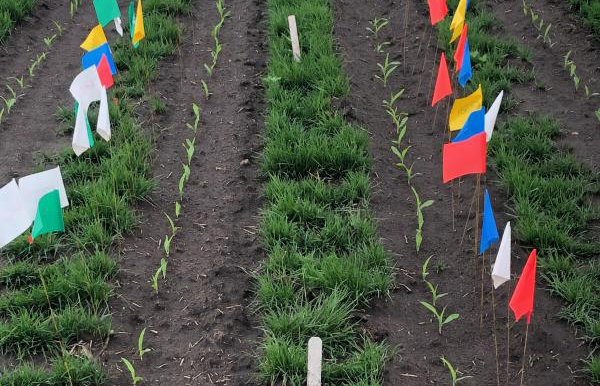Cover Crop Testing
Testing Cover Crops for Farmers Own Use, for NRCS Programs and for Sale to Others

Photo courtesy of PhD student, Chad Kimmelshue from his research field.
Which tests are required for cover crop seeds?
- For sale to others: (Mechanical) Purity, Noxious Weed Exam, Standard (Warm) Germination
- For the NRCS cover crop program: Purity, Germination
- For Own Use: Germination
Which crops are normally tested?
- Rye (Secale cereal subsp. Cereale), sometimes oats (Avena sativa).
What size of sample of seeds needs to be sent to a seed lab according to Association of Official Seed Analysts (AOSA) Rules for Testing Seeds?
- One thousand grams (approximately two pounds or a gallon size zip-lock bag ¾ full) of cereals, vetches, sorghums, or seeds of similar size (AOSA Rules Vol. 1, Section 1.4, #4).
How much seed is tested in the following tests for oats and rye?
- Purity: 75 grams
- Noxious Weed Exam: 500 grams (Purity weight included in this test – 425 + 75)
- Germination: ~ 25 grams
Are freshly harvested seeds tested differently than seeds harvested longer ago?
- Yes. PLEASE indicate whether the seed lot is freshly harvested.
- Freshly harvested seeds normally receive a PRECHILL treatment to break possible dormancy in the seed lot. This adds five days to the length of the Germination test.
- In a prechill, seeds are planted on moistened normal planting material (rolled paper towels) and placed in 5C (41 F) for five days. The normal germination period for oats is ten days (for a total of 15 days with a prechill) and seven days for rye (for a total of 12 days with a prechill).
How should a sample be collected?
- Page six of the AASCO Handbook on Seed Sampling “Sampling Seed in Bulk Containers” states that a minimum of seven primary samples (individual probes or handfuls before they are combined into a composite sample) are to be taken from a bulk container (which may be a wagon?).
- According to the sampling procedure, five containers (bags) should be sampled plus at least 10% of containers in the seed lot. Therefore, the amount of seed in bushels must be converted to bags of seed. For instance, 1600 bushels of rye is roughly the same as 1,792 (50 pound) bags of seed. Ten percent of 1,792 bags is 179 bags plus five bags for a total of 184 bags. BUT …
- IMPORTANT: It isn’t necessary to sample more than the equivalent of 30 bags of seed.
- Primary samples (triers, probes, or handfuls) are taken and combined into a composite sample. A small portion of the composite sample is sent to the seed lab (see the earlier item on amount of seeds to send).
- If a farmer has a seed trier, that would be preferred. If not, take handfuls from varying places and depths in the container evenly spaced so that (ideally) all parts of the container are sampled.
Does the Iowa State University Seed Lab have sample bags available?
- Yes, and they are free of charge. However, seeds can be sent in zip lock bags or other paper or plastic bags. The bag(s) should then be placed in a cardboard box to protect them during shipping.
What is the address of the Iowa State University Seed Lab?
ISU Seed Lab
2115 Osborn Drive
Ames, Iowa 50011
Where do I get more information?
- Seed Lab website: seedlab.iastate.edu
- Seed Lab Customer Care: seedlab@iastate.edu 515-294-6826
- Lab Manager: Mike Stahr mgstahr@iastate.edu 515-294-6826
What information do I send with the sample(s)?
- Fill out information needed on the bags we supply. This includes your contact information, account number (if you are a repeat customer), if the seeds are freshly harvested, and which tests are requested.
- Bags alone are okay for small batches, but filling out a submission form is better (available as a pdf or as an Excel spreadsheet). The submission form can be found at:
https://seedlab.iastate.edu/files/2022/03/ISU-Seedlab-Submission-Form.pdf
How are results sent out?
- By US Mail, e-mail or FAX.
How is testing invoiced and paid for?
- The report of analysis has the fee listed as well as test results, but payment is not made from the report. A billing statement will be sent at the end of the month, but payment isn’t made from this either. Finally, Iowa State University Accounts Receivable will mail an invoice and payment is made from that invoice.
- Payment is normally made by check as we don’t accept credit cards.
Cover Crop Testing
Test Details
Testing Cover Crops for Farmers Own Use, for NRCS Programs and for Sale to Others
Cover Crop Testing
Quick guide to Cover Crop Testing:
Required tests for sale to others:
- Germination
- Purity
- Noxious Weed Exam
(IA for sale in IA, USA for sale outside IA)
Required tests for NRCS program:
- Germination
- Purity
Tests for own use:
- Germination
- Fresh seed is tested differently, please indicate if the seed is freshly harvested.
Amount to send:
- One full bag(16 oz size) of Rye, Wheat, or Barley
- Two full bags(16 oz size) of Oats
